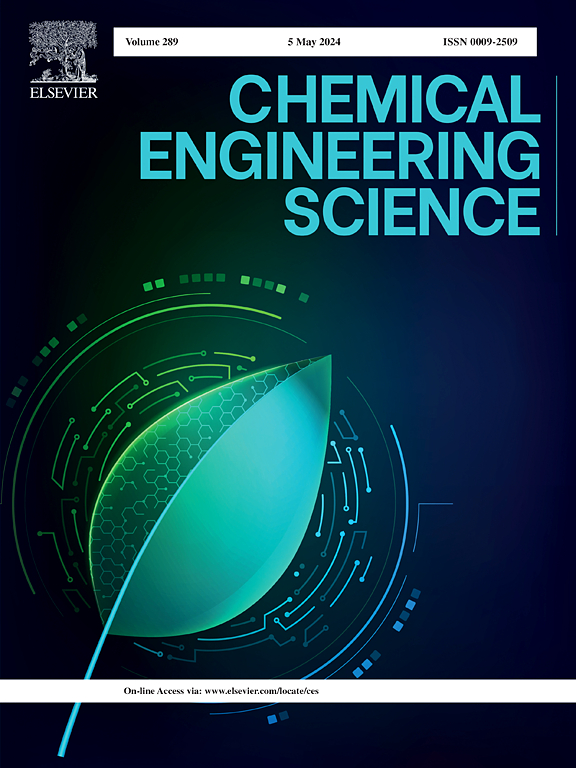Molecular simulation of CO2–hydrocarbon minimum miscibility pressure in tight reservoir nanopores under varying wettability conditions
IF 4.3
2区 工程技术
Q2 ENGINEERING, CHEMICAL
引用次数: 0
Abstract
Tight oil reservoirs are characterized by low porosity, low permeability, and the development of micro- and nano-scale pore structures. Conventional depletion and water flooding methods are generally ineffective, making CO2 flooding a widely adopted approach to enhance oil recovery. The minimum miscibility pressure (MMP) is a key parameter in determining whether CO2 can achieve miscibility with crude oil. However, due to the strong heterogeneity in the wettability of tight oil reservoirs, the mechanism by which different wettability conditions affect the MMP of CO2–oil systems remains unclear.In this study, quartz nanopore models with varying wettability were constructed, and Non-Equilibrium Molecular Dynamics (NEMD) simulations were performed to calculate the MMP within nanopores. The effects of temperature, pore size, wall wettability, and crude oil composition on the MMP and CO2 storage efficiency were systematically analyzed. The results show that the MMP within nanopores is lower than that in the bulk phase. MMP increases with temperature and exhibits a non-monotonic trend with decreasing pore size—initially decreasing and then increasing. As the wettability shifts from water-wet to oil-wet, the MMP tends to increase. Due to the strong interactions between the pore wall and CO2 molecules, water-wet reservoirs are more favorable for CO2 storage and result in a lower MMP in CO2–oil systems.This study provides new insights into the microscopic miscibility mechanisms of CO2 and oil under varying wettability conditions in tight reservoirs and offers theoretical support for enhancing oil recovery and CO2 sequestration through CO2 injection in tight oil formations.不同润湿性条件下致密储层纳米孔中co2 -烃最小混相压力的分子模拟
致密油储层具有低孔低渗、微纳米级孔隙结构发育的特点。常规的驱油和水驱方法通常是无效的,因此二氧化碳驱油是一种广泛采用的提高采收率的方法。最小混相压力(MMP)是决定CO2能否与原油实现混相的关键参数。然而,由于致密油储层润湿性具有较强的非均质性,不同润湿性条件对co2 -油体系MMP的影响机制尚不清楚。在本研究中,构建了不同润湿性的石英纳米孔模型,并进行了非平衡分子动力学(NEMD)模拟来计算纳米孔内的MMP。系统分析了温度、孔隙大小、壁面润湿性和原油成分对MMP和CO2储存效率的影响。结果表明,纳米孔内的MMP低于体相。MMP随温度升高而增大,且随孔径减小呈先减小后增大的非单调趋势。随着润湿性从水湿性转变为油湿性,MMP趋于增加。由于孔壁与CO2分子之间的强相互作用,水湿储层更有利于CO2的储存,导致CO2 -油体系的MMP较低。该研究为致密储层不同润湿性条件下CO2与油的微观混相机理提供了新的认识,为致密油地层注入CO2提高采收率和固存CO2提供了理论支持。
本文章由计算机程序翻译,如有差异,请以英文原文为准。
求助全文
约1分钟内获得全文
求助全文
来源期刊

Chemical Engineering Science
工程技术-工程:化工
CiteScore
7.50
自引率
8.50%
发文量
1025
审稿时长
50 days
期刊介绍:
Chemical engineering enables the transformation of natural resources and energy into useful products for society. It draws on and applies natural sciences, mathematics and economics, and has developed fundamental engineering science that underpins the discipline.
Chemical Engineering Science (CES) has been publishing papers on the fundamentals of chemical engineering since 1951. CES is the platform where the most significant advances in the discipline have ever since been published. Chemical Engineering Science has accompanied and sustained chemical engineering through its development into the vibrant and broad scientific discipline it is today.
 求助内容:
求助内容: 应助结果提醒方式:
应助结果提醒方式:


